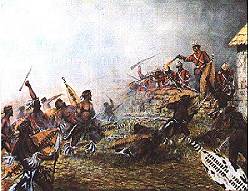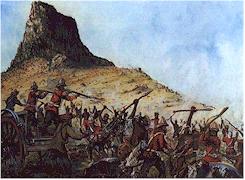| Foreign Policy | ||||||||||||||||||
| The Bojana Church, Sofia, Bulgaria |
THE EASTERN QUESTION The Eastern Question Since the emergence of Russia as a European Power the prime aim of her foreign policy had been to expand her frontiers South, South East, and North West. The foundation of a new Capital, St. Petersburg, together with its island naval base of Kronstadt, in 1704, and the annexation of Finland in 1808 had given Russia what she wanted in the north-west. The main obstacle to her expansion southwards was Turkey, but Turkey was, as Nicholas I said later, ?the Sick Man of Europe?, and Russia had been pushing south when the threat from Napoleon had forced Tsar Alexander to make terms with the Turks by the Treaty of Bucharest in 1812. In 1821, when the Greeks revolted against their Turkish overlords, it had been a great temptation to Alexander to take advantage of Turkey?s difficulties and to renew the attack southward, but Metternich was able to restrain him in the interest of the principles of the Holy Alliance. In 1825 Tsar Nicholas I ascended the Russian throne, and it was soon clear that no Holy Alliance would hold him back from what he regarded as the natural direction of Russian foreign policy. Russia?s problem was that although she might wage a successful war against Turkey, the Powers of Europe would object to Russian annexation of Turkish territory. While Metternich clung to the hope of the Holy Alliance, the most forceful resistance would probably come from Great Britain, but owing to her very small army this resistance could only be effective if Britain had a continental ally. The British government hoped mainly for support from France in this theatre, and Russian policy consequently had much to fear from the Anglo-French friendship. For Russia the fact that direct annexation of Turkish territory might lead to a major war or - at best - a partition of Turkish possessions in Europe among the Powers, called for a diplomatic rather than a military approach to the problem. Thus Russia?s policy was aimed mainly at preserving the status quo while gradually establishing a general influence over the Turkish government. For Britain there were two dangers. Russia was now a naval as well as a military force. The Ionian Isles served as a useful naval base for the British fleet, but if British naval supremacy in the eastern Mediterranean was not to be seriously undermined, Russia must be prevented from gaining control of the Straits of the Bosphorus and the Dardanelles. The second danger lay in Russian interests east of the Black Sea, on the Persian and Afghan borders. One British route to India lay via Egypt and the Red Sea, but a second route under consideration ran overland along the line of the Euphrates. Concern for the security of these two routes was inevitably to play a great part in British diplomacy in the following decades. Two lines of policy were open to the British government. one was to bolster up Turkey against Russia and to maintain the existing situation in the Near East. The other policy rested on the assumption that Turkey?s hold over her European possessions was doomed. In that case, some alternative had to be found to absorption by Russia, and this could only mean some form of agreement with Russia over the establishment of various independent national states in the Balkans. This second policy was hardly a final solution, since it would transform the struggle into one in which the neighbouring Powers, Austria and Russia, intrigued to gain political and economic control over the new states. This complex of conflicting interests consequent on the decaying might of the Turkish Empire constituted the Eastern Question, and it was to bedevil international relations throughout the nineteenth century and in a slightly changed form has continued to do so throughout the twentieth. | |||||||||||||||||

| ||||||||||||||||||
|
SOUTH AFRICA South Africa In South Africa the growth of the white population with the development of mining had led to an increasing antagonism between Europeans and natives. The existence of large native armies, such as Cetewayo?s Zulus, who numbered 40,000, added to the likelihood of general war, and it as becoming increasingly clear that the day of ad hoc decisions on the spot was over. Some statesmanlike settlement of the whole country was called for, and Disraeli?s Colonial Secretary, Lord Carnarvon, encouraged by the success of the Canadian federation in 1867, was convinced of the need for a similar federation that would become the Dominion of South Africa. In 1875 and 1876 a number of consultations with the Presidents of the two Boer republics took place in South Africa and in London, but eventually came to nothing. an outbreak of fighting between the Boers and the Bantu tribes persuaded Carnarvon that delay would be fatal and, as a preliminary measure, he drafted a Parliamentary Bill that would permit the formation of a federation. Simultaneously he sent Sir Theophilus Shepstone to South Africa to negotiate with the Transvaal and to annex the republic, if the inhabitants were willing. In the spring of 1877 sir Bartle Frere was appointed Governor of the Cape, but on his arrival he learnt that Shepstone had already proclaimed the annexation of the Transvaal. Carnarvon had made the mistake of dividing his authority in South Africa. It was soon clear that Shepstone had rushed the whole thing through too quickly, and in jeopardising the chances of getting the Transvaal Boers to acquiesce had added considerably to the difficulties that faced the new Governor, although for the moment the Boers made no resistance owing to the presence of the Zulus. A boundary settlement between the Transvaal and the Zulus was urgently needed, and Fere managed to negotiate an extremely fair-minded agreement with Cetewayo, which went a long way to meet the Zulus? claims. At the same time, however, he stipulated that the Zulu army must be disbanded and a British resident would be allowed into their territory. The Zulus, feeling that this would mean death for their form of society and way of life, rejected the terms, and at the end of 1879 Disraeli and his Cabinet found that they had a colonial war on their hands. This was bad enough, but there was worse to follow. Ten days after Lord Chelmsford had marched his forces in Zululand, a Zulu army fell upon his camp at Islandhlwana and carried out a wholesale massacre. The British public first head the news on 11 February 1879, and opinion which had been so enthusiastically in favour of the government the previous summer now became highly critical. Fortunately the situation improved. Natal, endangered by the defeat was saved by the defence of Rorke?s Drift and in July the Zulu army was smashed at the battle of Ulundi. There followed the capture and deportation of Cetewayo and the splitting up of Zululand into eight principalities. | The Battle of Rorke's Drift | |||||||||||||||||

| ||||||||||||||||||
| The Battle of Isandhlwana | Please e-mail if you have any further questions... | |||||||||||||||||

| ||||||||||||||||||
| Favorite Links | |||||||||||||||||

| ||||||||||||||||||
|
This page has been visited
|